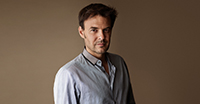Interview. FRANÇOIS OZON: “I don’t suffer”

Film maker. July, 2014. François Ozon born 15 November 1967 is a French film director and screenwriter whose films are usually characterized by sharp satirical wit and a freewheeling view on human sexuality. He has achieved international acclaim for his films 8 femmes (2002) and Swimming Pool (2003). Ozon is considered to be one of the most important French film directors in the new “New Wave” in French cinema such as Jean-Paul Civeyrac, Philippe Ramos, and Yves Caumon, as well as a group of French filmmakers associated with a « cinema du corps/cinema of the body ».
Mr. Ozon, your films have always portrayed the inner psyche of women extremely well. What fascinates you about women?
I think it’s easier for me to work with women and actresses. I take more pleasure because they are more clever, they are able to take more risks. I think there is a chemistry between us, more than with men. Maybe because I’m a man I have more distance from them and it’s easier for me to work with women. Very often when I work with men, there are problems with the ego of the actor, they are more complicated. And sometimes I feel like I’m in front of myself and if I’m the director it’s because I want to be behind the camera not in front of the camera.
When did you realize that you prefer to tell stories from a woman’s perspective?
I discovered that when I did Under the Sand with Charlotte Rampling. I realized filming a face and projecting many things on a face it is possible to think about so many things. Fassbinder said that what he liked about Douglas Sirk’s work was the fact he had the feeling to see for the first time women thinking on the screen. Usually women just have to look pretty in movies and I like to try to show the psyche or the interior of a woman or a little girl. I think with women it’s easier than men, I don’t know why. Maybe I haven’t yet found the right actor to have all these emotions.
I thought Melvil Poupaud did a great job in Time to Leave.
Yes, but Melvil is like an actress, he likes to be watched. And it depends, the men who are very feminine – not in the way if they are gay or anything – but the fact that they accept their part of femininity makes it easier to work with them. Sergi Lopez is very feminine, too.
Even though many of your films are about women, do the characters still reflect your personality?
It has to do with myself, of course. It’s easier for me to project myself in a woman because I am a man. I have more distance. That’s why Time to Leave with Melvil was difficult for me because suddenly I felt like I had a mirror in front of me. I think I speak about myself but you are not really able to see, “Oh, that’s him.” I am hiding myself.
Your films also tend to contradict the rules of their genre. Why?
I think I am a cinephile-director, so I like many different movies: I can like horror movie, melodrama, Japanese film… it’s not a problem for me to like very different movies because that is what I like in cinema – it’s the richness. So when I make my films I don’t think, “Oh, I want to make this genre,” or anything. But what I like in cinema is variety and to me it’s different films. I don’t want to be just in one way, I like to try different ways. So sometimes it’s very disturbing for the audiences and critics because they can’t say: it’s a comedy, it’s a drama… it’s difficult to define.
Does that make it harder to find financing for your projects?
Yes and it’s also more difficult today to finance a film with a medium budget. It’s easier to make a very small film with a low budget like Le Refuge or a big comedy like Potiche with big stars. It’s more difficult when you try to make something in the middle, something more difficult in commercial terms because you don’t know exactly what the film is going to be like. So I try to be close to the production, to adapt each film to the economy.
What is your ideal scenario?
If I could, I wouldn’t write a script. But you need to write a script because you need to find money, to find finance and to for the description with the technicians it’s easier to have a script. For me I don’t like scripts, I don’t like to write a script. If I could I wouldn’t have a script.
With 8 Women and Swimming Pool you achieved international success. Did you have more freedom to pursue more difficult stories after that?
Yes a little bit. Swimming Pool was even more successful than 8 Women actually. It depends on the country, but Swimming Pool was very successful in America. But after those two films, I wanted to go back to a very small budget. I had this freedom to make some more difficult films like Time To Leave or 5×2. And maybe after 8 Women I was a bit tired of working with big actors. I wanted a change. But now I feel better. I know them and I’m more mature.
After those two films, the door to Hollywood was wide open for you. Why did you decide not to take that step?
To do what? To become like the German directors who go to Hollywood now? They aren’t German anymore. I’m still French. I liked Hollywood in the ’40s and ’50s, but now I’m not sure I would find my place and I’m not sure if I would be able to work under their conditions. In France you are very free as a director, you have the final cut. In America, the important person is not the director, but the producer. In France even if you are not established, a young director is respected.
Where do you think that attitude comes from?
It’s the law, the final cut is for the author of the film. Is it not like that in Germany? François Truffaut said the Americans respect you when you stay in your country, but when you arrive in America it’s finished. They’ll destroy you. Do you know a good European director who makes good films in Hollywood? Maybe Stephan Frears? He tried, but he came back.
Speaking of Truffaut, how much of an influence did the New Wave directors have on you?
Truffaut, Rohmer, Claude Chabrol, they were the great directors of the Nouvelle Vague. They found the freedom to make exactly the films they wanted. Chabrol was important because he was able to make very strong portraits of women and very complex portraits of women. He was very clever and he had a lot of joy and pleasure. He didn’t have some big theories about his work, he just enjoyed making films. I try to work like that.
You must at the pace that you produce films.
I would be able to shoot even more if I didn’t have the promotion and all these kinds of things to do. I would do it like Fassbinder – seven films a year! – if I could. Making films is a pleasure for me. Many of my friends are directors and it’s very heavy work for them, they suffer a lot. I don’t suffer. Of course there are some difficult moments, but most of the time it’s a pleasure to make movies. Jeu d’enfant – I don’t know how to say that. It’s very childish to make a film, so I take a lot of pleasure in it. (Talks)










